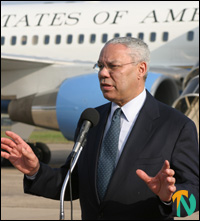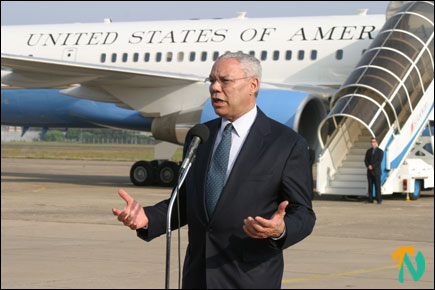2nd lead (add details photos)
US military presence will not affect Peace Process - Colin Powell
[TamilNet, Friday, 07 January 2005, 11:40 GMT]
Pledging USD 25 million for immediate relief and reconstruction of Sri Lanka, US Secretaryof State Colin Powell said in a press briefing held at the runway at the Katunayake Air Force Base, Colombo, that US military
presence will not affect the ongoing peace process. Responding to a question about how long the US military would stay, he said they would remain long as it is required by the Sri lankan government and would ensure that the reconstruction and rehabilitation work is
complete.

Mr Powell toured tsunami ravaged Southern harbour city Galle where US marines are stationed and was on his way to Nairobi when he talked to the reporters for 10 minutes at 4.45 pm.
Of the 25 million $4m will be used for immediate humanitarian needs and a further $10m will be utilized for temporary housing. US has promised similar amounts for twelve other countries, Mr Powell said.
Responding to a question on how the US presence will affect the peace process in Sri Lanka, Mr Powell said: ''Our military presence is strictly for humanitarian and rehabilitation purposes only. Matters related to the peace process needs to be resolved between the two affected parties with the help of Norwegian friends. We hope that all Sri Lanka would come together during this crisis and work together. This we hope would lead to resolution of political issues related to peace process.''
Mr Powell did not elaborate on how the US troops would be employed in rehabilitation and humanitarian work.
Mr Powell said that the U.S received request for help from Sri Lanka's President and Foreign Minister within 48 hours of the disaster. He added that U.S will continue to assess the situation throughout the tsunami affected region and react appropriately.
Excerpts from the press briefing follow:
Question: How do you see the relief effort developing?
Mr. Powell: We are going to provide support working with the international
community. American USAID personnel are hard at work delivering food
assistance, medical assistance, providing shelter. We are going to do
more. 4 million dollars of goods are being distributed now another
10 million dollars is going to be spent on employment program that
will employ Sri Lankans in the clean up and reconstruction effort and
start the economy going again in those parts of the country that were
hit hardest.
Another 10 million dollars will be going to Sri Lanka for the purpose
of constructing temporary housing in order to getting people out of
from under plastic sheeting into temporary housing until such time as
permanent housing can be made available.
Total US contribution is roughly 25 million dollars or so and I
expect it will go up in the days ahead as we get a better
understanding of the needs of the Sri Lankan people.
The President and I also talked about the program called the
millennium challenge account which is a new initiative of president
Bush where we help developing nations that are committed to democracy
build their infrastructure.
The international community has mobilized in a way that I have never
seen before to help the effected people to rebuild their houses,
school sand business and above all rebuild their lives.
We will be here for a long period of time by the simple fact that our
embassies are here our USAID missions are here, US military forces
are in the region. I canít tell you how long they will stay, there
are other missions that have to be performed in due course. Our
marines will be arriving in greater strength tomorrow. We expect
engineering unit and some medical personnel will be coming ashore in
a next couple of days. But I cannot tell you how long those units
will be here. But in terms of recovery effort the principle agent
responsible for the recovery effort is the Sri Lankan government and
as long as it takes them to restore infrastructure and reconstruct
their society the United States will be here with them. But the
numbers will vary in accordance with the need.
 Question:
Question: Did you have any contacts with the LTTE?
Mr. Powell: I haven't had any contacts with them. The reports I receive from the
government suggest that aid is going into the northern part of the
country, those parts of the country that are under their control. The
government believes that the Tamil regions are getting much or more
as their proportion and youíll have to wait and measure that over
time. But I know that aid is going there but I had no conversation
with any of the members of the LTTE.
Marines for the most part I think will be, I donít have the details
of their plan, but will be working for the most part in the southern
part of the country. They will go to other parts of the country for
medial purposes and up to the north to restore capacities of one of
the hospitals. And I will leave to the military commander to make
judgments as to how best to deploy the forces that he will have
available to him.
Question: What do you think the US role will be in Sri Lanka's Peace Process?
Mr. Powell: As you know we have always tried to pay a helpful role working with
our Norwegian colleagues. My deputy secretary Mr. Armitage has been
deeply involved in the process.
I donít think our military presence in anyway shapes or affects
political situation.
Ultimately the problem has to be solved between the parties
concerned. United States military presence is strictly for
humanitarian purposes and not in any way to influence political
outcome one way or the other.
We are hopeful however that if all Sri Lankans come together to deal
with this common catastrophe, this common crisis, and work with each
other and cooperate with each other and cooperate with each, then
perhaps that spirit of cooperation can be elevated and extended into
the political dialogue and find a way forward to a political solution
to this long standing crisis between government and the LTTE.







 Mr Powell toured tsunami ravaged Southern harbour city Galle where US marines are stationed and was on his way to Nairobi when he talked to the reporters for 10 minutes at 4.45 pm.
Mr Powell toured tsunami ravaged Southern harbour city Galle where US marines are stationed and was on his way to Nairobi when he talked to the reporters for 10 minutes at 4.45 pm.